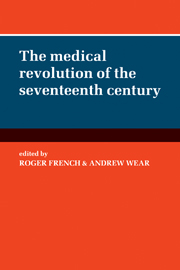Book contents
- Frontmatter
- Contents
- List of contributors
- Acknowledgements
- Introduction
- 1 Medicine, religion and the puritan revolution
- 2 Harvey in Holland: circulation and the Calvinists
- 3 The matter of souls: medical theory and theology in seventeenth-century England
- 4 Mental illness, magical medicine and the Devil in northern England, 1650–1700
- 5 Passions and the ghost in the machine: or what not to ask about science in seventeenth- and eighteenth-century Germany
- 6 Thomas Sydenham: epidemics, experiment and the ‘Good Old Cause’
- 7 The medico-religious universe of an early eighteenth-century Parisian doctor: the case of Philippe Hecquet
- 8 Isaac Newton, George Cheyne and the Principia Medicinae
- 9 Physicians and the new philosophy: Henry Stubbe and the virtuosi-physicians
- 10 The early Royal Society and the spread of medical knowledge
- 11 Medical practice in late seventeenth-and early eighteenth-century England: continuity and union
- Index
10 - The early Royal Society and the spread of medical knowledge
Published online by Cambridge University Press: 05 January 2012
- Frontmatter
- Contents
- List of contributors
- Acknowledgements
- Introduction
- 1 Medicine, religion and the puritan revolution
- 2 Harvey in Holland: circulation and the Calvinists
- 3 The matter of souls: medical theory and theology in seventeenth-century England
- 4 Mental illness, magical medicine and the Devil in northern England, 1650–1700
- 5 Passions and the ghost in the machine: or what not to ask about science in seventeenth- and eighteenth-century Germany
- 6 Thomas Sydenham: epidemics, experiment and the ‘Good Old Cause’
- 7 The medico-religious universe of an early eighteenth-century Parisian doctor: the case of Philippe Hecquet
- 8 Isaac Newton, George Cheyne and the Principia Medicinae
- 9 Physicians and the new philosophy: Henry Stubbe and the virtuosi-physicians
- 10 The early Royal Society and the spread of medical knowledge
- 11 Medical practice in late seventeenth-and early eighteenth-century England: continuity and union
- Index
Summary
The establishing of the Royal Society promised to be an event of great significance for medicine in England. After all, right from the start, a substantial minority of its inner core included those physicians and inquirers into the economy of life who had made the College of Physicians such a lively body during the interregnum – men such as Goddard, Ent, Glisson and Croune – responsible for what Frank has seen as the Harveian research programme. And, more broadly, medical practitioners constituted easily the largest and most active single occupational group – about a fifth – amongst the early fellows. In his History of the Royal Society of London (1667), Thomas Sprat bent over backwards to disarm any hostile critics who might fear that the assimilation of medical men within the Society would prejudice the rights and interests of the College of Physicians; and the fact that some leading College physicians – not least its censor, Thomas Wharton, and its president, Baldwin Hamey, aided by his nephew, the maverick, Henry Stubbe – resented the Society's intrusion and attempted to discredit its pretensions, helps confirm that its foundation was indeed recognized as promising, or rather threatening, a shift in the centre of gravity of medical inquiry and authority.
There can be little doubt that that actually happened, temporarily at least.
- Type
- Chapter
- Information
- The Medical Revolution of the Seventeenth Century , pp. 272 - 293Publisher: Cambridge University PressPrint publication year: 1989
- 5
- Cited by



